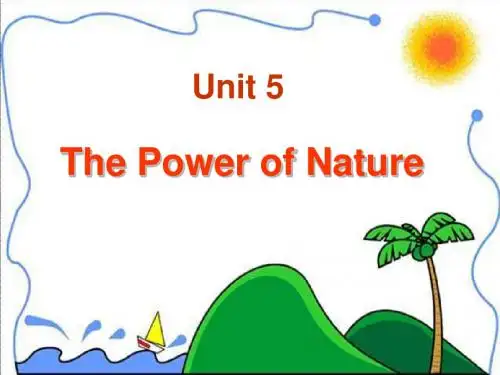新标准人教版选修6unit5thepowerofnaturereading公开课
- 格式:pptx
- 大小:4.96 MB
- 文档页数:62
![新人教选修六Unit5Thepowerofnature-Reading[阅读课件]](https://uimg.taocdn.com/2c2d706e79563c1ec5da71fe.webp)
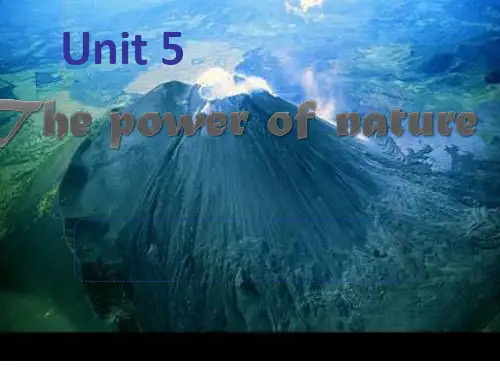
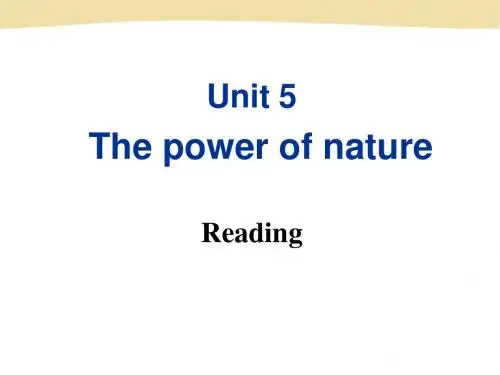
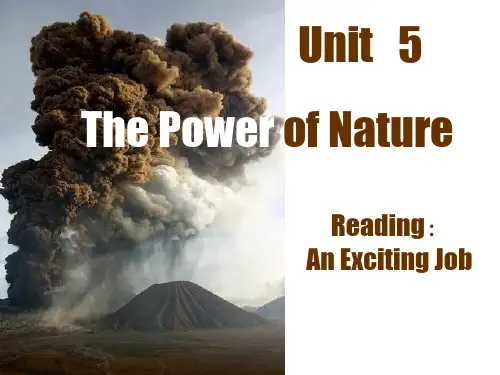
![Unit 5 The power of nature-reading[新人教版选修6]](https://uimg.taocdn.com/e4d144e3a8956bec0975e3cf.webp)

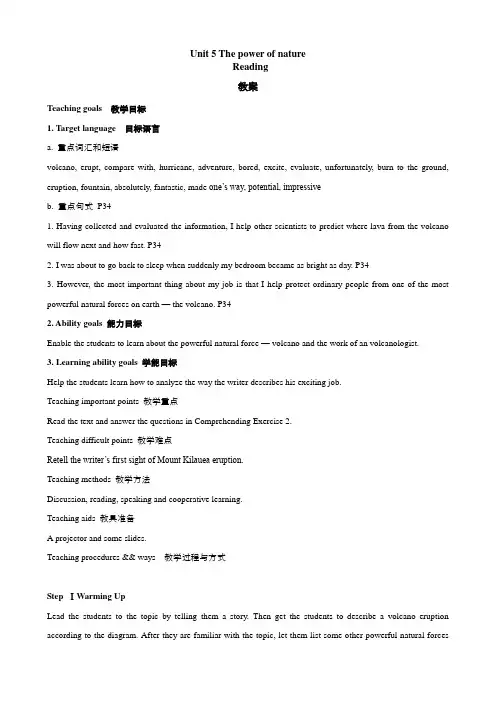
Unit 5 The power of natureReading教案Teaching goals 教学目标1. Target language 目标语言a. 重点词汇和短语volcano, erupt, compare with, hurricane, adventure, bored, excite, evaluate, unfortunately, burn to the ground, eruption, fountain, absolutely, fantastic, made one’s way, potential, impressiveb. 重点句式P341. Having collected and evaluated the information, I help other scientists to predict where lava from the volcano will flow next and how fast. P342. I was about to go back to sleep when suddenly my bedroom became as bright as day. P343. However, the most important thing about my job is that I help protect ordinary people from one of the most powerful natural forces on earth — the volcano. P342. Ability goals 能力目标Enable the students to learn about the powerful natural force — volcano and the work of an volcanologist.3. Learning ability goals 学能目标Help the students learn how to analyze the way the writer describes his exciting job.Teaching important points 教学重点Read the text and answer the questions in Comprehending Exercise 2.Teaching difficult points 教学难点Retell the writer’s first sight of Mount Kilauea eruption.Teaching methods 教学方法Discussion, reading, speaking and cooperative learning.Teaching aids 教具准备A projector and some slides.Teaching procedures && ways 教学过程与方式Step ⅠWarming UpLead the students to the topic by telling them a story. Then get the students to describe a volcano eruption according to the diagram. After they are familiar with the topic, let them list some other powerful natural forcesand discuss the ways human beings protect themselves from the natural forces.T: Listen to me carefully. I will tell you a story about a strange city. The strange city named Pompeii is a dead city. No one has lived there for nearly two thousand years, yet every year thousands of people travel from distant countries to visit it. It died suddenly in a terrible rain of fire and ash. Tons of hot ash fell on Pompeii, hiding it from sight. For three days the sun didn’t break through the clouds of ash in the sk y. Then the whole city shook and buildings fell down. When everything was calm, Pompeii was buried deep. A city disappeared and people there lost their lives too. Can you guess what had happened to the city?S1: There must have been a terrible earthquake. After the terrible quake, everything was destroyed.T: Yes. It’s one kind of the causes. Any different ideas?S2: Maybe a volcano erupted and a terrible rain of fire and ash fell on the city.T: You got it! Mount Vesuvius, which had slept quietly for centuries, erupted suddenly. It destroyed the city Pompeii. How terrible! Have you ever seen a volcano erupting? Please turn to page 33. Look at the diagram. Describe a volcano erupting using the diagram and the given words.S3: When boiling rock erupts from the volcano, the red hot lava rushes hundreds of metres into the air and a cloud of ash goes straight up into the air. Ash cloud forms. Rocks, fire, ash fall onto the ground. The lava flows slowly down the mountain. It buries everything in its path under the molten rock.S4: Sometimes, volcano erupting can cause some other disasters like earthquakes, fire and ground sea.T: How powerful the nature is! The lava can buries everything in its path. A volcano erupting can damage a city. A flood can carry everything in its path, while a fire will damage everything it meets. It seems that we human beings are powerless in front of these natural forces. What can we do to protect ourselves from powerful natural forces? Please work in groups of four to list some other natural forces and discuss the ways that human beings protect ourselves.A few minutes later.T: Who would like to share your opinion with the class?S5: I’d like to talk about volcano. Sometimes, the volcano gives warnings in the form of many small earthq uakes. And scientists can provide warnings of possible volcano explosions with the help of equipment. So the government can help people who live near the volcano leave their homes before erupting.S6: We are more familiar with fire. In fact, it can be avoided most of the time, if we are careful in our daily life. I know a way of controlling the fire. Firefighters burn the trees which are in the path of the fire, so there is nothing to burn when the fire arrives.S7: Flood always happens in the south of our country. Predication is very important. Scientist keep observing thelevel of the water during the summer. People strengthen the bank and move to higher land.S8: We have learned more about earthquakes. People have learned many ways to protect themselves. For example, earthquake happens, if you are in bed, stay where you are and protect your head with a pillow. If you are outdoors, find a clear spot away from buildings, trees and streetlights.S9: I think the best way is to move to a safer place where fire, earthquake, flood and hurricane will never happen.Step ⅡPre-readingGet the students to answer the six questions on page 33 to find out whether they will enjoy working as a volcanologist. And then get them to talk about the occupation according to the questions.T: I see. Prediction is very important. We can say scientists play an important part in protecting people from natural forces. Would you like to study volcanoes? And do you want to be a volcanologist?Ss: Yes.T: Let’s test whether you are suitable for this job or not. Answer “yes” or “no” to these que stions on page 33.The students answer the questions to see if they are suitable to be a volcanologist.T: Are you suitable for the job? Who can tell us what kind of person can be a volcanologist?S1: First he must be brave enough because he must climb into a live volcano to take the temperature of the boiling rock inside.S2: I think interest is the most important. He should show great interest in studying rocks and volcanoes.S3: He should be interested in travelling to unusual places and like adventure in his life.S4: If you want to be a volcanologist, you should enjoy working outside because a lot of work need to be done outdoors.Step ⅢWhile-readingScanningGet the students to read the passage quickly and accurately. Give them a couple of minutes to look through the whole passage. Tell them to read the text silently and then ask them some detailed questions about the text.T: What do es a volcanologist do? Is the work interesting? Let’s read a passage written by a volcanologist. The volcanologist enjoys his job very much. He described his exciting job. And he wrote down his first sight of an eruption. Now let’s read the text quickly an d find out the answers to these questions Comprehending Exercise 1 on page 35 .Several minutes later.Check the answer..SkimmingIn this part, the students will read the text quickly to get the general idea of the passage. Check the answers with the whole class, then explain some sentences or words that the students may find hard to understand.T: Now please read the text again and try to get the main idea of the passage in groups of four.Three or four minutes later.T: Have you got the general idea of the text?It wasn’t very easy to walk in these clothes, and we slowly made our way to the edge of the crater and looked down into the red, boiling center. Though I was a little afraid, I wanted to climb down into the crater to collect some lava. But this being my first experience, I could only stayed at the top and watched the two scientists. At that time I determined to be a volcanologist forever.DiscussionT: In the writer’s opinion, his job is the greatest one. Do you like this occupation? Why or why not? Discuss in groups of four.S2: I would not like to be a volcanologist. I prefer to work in an office to do some research work. It’s a waste of time and energy to spend so much time traveling.S3: I hope to be a vocanologist. You’ll be proud of yourse lf when people escape before volcano erupting because of your work. Also, I am interested in the rocks and other things that make up the surface of the earth. I want to know the secret of the earth.S4: It is not my ideal occupation. I like traveling to unusual places, studying different cultures, talking with interesting people and collecting interesting things. But I’m not brave enough to climb into a live volcano to take the temperature of the boiling rock inside.S5: I don’t like this job. It’s too dang erous. If the volcano erupts suddenly when you are collecting the lava, maybe you will lose your life.T: Well, if you meet the writer, what kind of questions would you ask him?S6: Aren’t you afraid when you walk towards the volcano? It’s so hot and the v olcano may erupt again.S7: What should you do if you get lost on your way to the volcano?S8: When did you begin to be interested in volcanoes?S9: How will you escape if the volcano erupts suddenly?S10: Are there any living things in volcanoes?S11: Why do people live near the volcanoes since they may lose their homes or even lives?Writing characteristicsT: Good! If you are interested in this occupation, you can get more information on the Internet. Now who can summarize the writing style and techniques of this text?The teacher can ask the students to have a discussion in pairs or groups, and then ask some of them to show their ideas.Sample answers:This passage was written by a volcanologist. He uses the first person to describe his exciting job and his experience and express his true love for his job. The words are vivid and the description is natural, which makes the readers feel as if they were watching the volcano eruption and begin to like the occupation. For example, he uses “like a railway train passing outside my window”, “suddenly my bedroom became as bright as day” and “red hot lava was fountaining hundreds of metres into the sky” to describe the big noise and fantastic sight of volcano eruption. To tell readers that his job is intere sting, the writer uses several “sometimes”, which makes the readers feel the job is extremely interesting and want to be a vocanologist. The writer talks about the volcano objectively. He points out the damages of volcano but he praises its fantastic sight at the same time.T: What can we learn from the text?S: The key word of the text is “exciting”, which is the focus of the passage. By telling the readers his everyday work, the importance of his job, his first sight of volcano eruption and his sincere love for his job, the author proves it’s his chief enjoyment to be a volcanologist. And I appreciate the writer’s attitude towards nature. We should love nature and we can do something to minimize the damage caused by natural forces.Step ⅤHomeworkT: No w it’s time for homework. Today you have two tasks to finish after class. The first task is to finish exercises in Discovering useful words and expressions on page 35. These exercises will help you practice the words and expressions we’ve just learned. The second one is to retell the text. That’s all for today. See you tomorrow.。
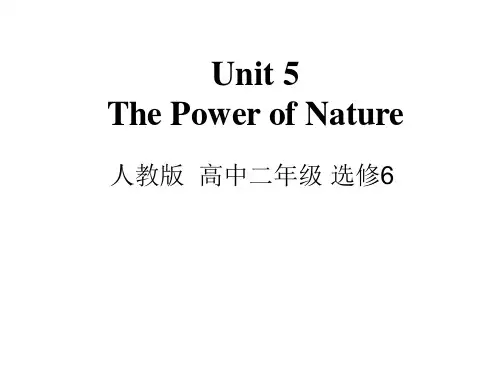
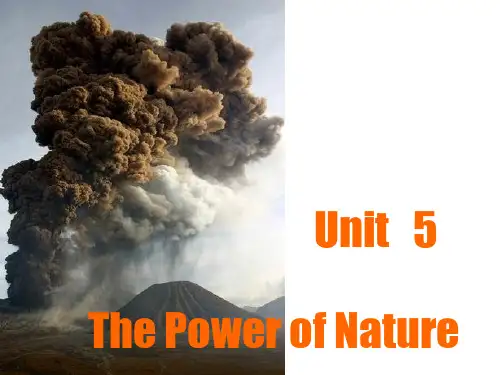
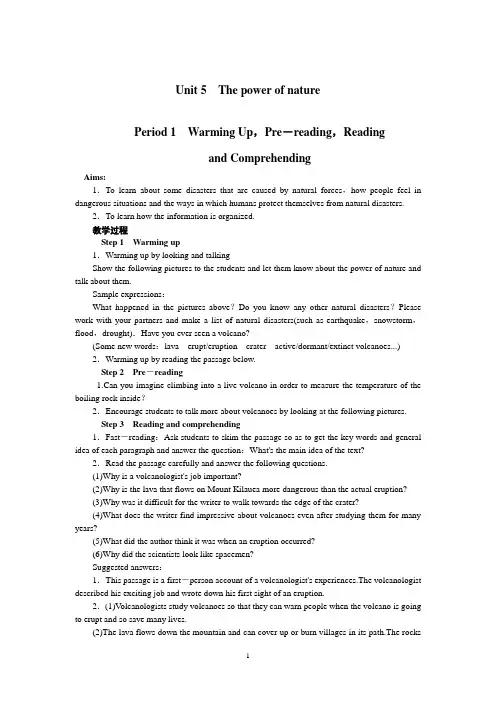
Unit 5The power of naturePeriod 1Warming Up,Pre-reading,Readingand ComprehendingAims:1.To learn about some disasters that are caused by natural forces,how people feel in dangerous situations and the ways in which humans protect themselves from natural disasters.2.To learn how the information is organized.教学过程Step 1Warming up1.Warming up by looking and talkingShow the following pictures to the students and let them know about the power of nature and talk about them.Sample expressions:What happened in the pictures above?Do you know any other natural disasters?Please work with your partners and make a list of natural disasters(such as earthquake,snowstorm,flood,drought).Have you ever seen a volcano?(Some new words:lava erupt/eruption crater active/dormant/extinct volcanoes...)2.Warming up by reading the passage below.Step 2Pre-reading1.Can you imagine climbing into a live volcano in order to measure the temperature of the boiling rock inside?2.Encourage students to talk more about volcanoes by looking at the following pictures.Step 3Reading and comprehending1.Fast-reading:Ask students to skim the passage so as to get the key words and general idea of each paragraph and answer the question:What's the main idea of the text?2.Read the passage carefully and answer the following questions.(1)Why is a volcanologist's job important?(2)Why is the lava that flows on Mount Kilauea more dangerous than the actual eruption?(3)Why was it difficult for the writer to walk towards the edge of the crater?(4)What does the writer find impressive about volcanoes even after studying them for many years?(5)What did the author think it was when an eruption occurred?(6)Why did the scientists look like spacemen?Suggested answers:1.This passage is a first-person account of a volcanologist's experiences.The volcanologist described his exciting job and wrote down his first sight of an eruption.2.(1)Volcanologists study volcanoes so that they can warn people when the volcano is going to erupt and so save many lives.(2)The lava flows down the mountain and can cover up or burn villages in its path.The rocksthat erupt from the volcano usually don't damage anything because no one lives near the crater.(3)The author was wearing special protective clothing that made it difficult to walk.(4)The author finds their beauty and their potential to cause great damage very impressive.(5)He thought it was an earthquake.(6)Because they wore white protective suits that covered their whole body.3.Ask students to scan for detailed information and discuss the following question with their partners and be prepared to report to the class.Question:Having learned a little more about the work of a volcanologist,do you think it is an occupation you would enjoy?Give you reasons.Suggested answers:No,I probably wouldn't enjoy this job because I wouldn't have to live in other countries and I don't like being in dangerous situations,either.Above all,I'm not very good at science.ORYes,I'd love to do a job like this because I would enjoy working outside and I think I would enjoy the adventure.It would be exciting to meet people from different countries and I would feel good about helping people avoid danger.Step 4Language studyDealing with any language problem if any(words or sentences students might not understand)to help the students to have a better understanding of the text.Step 5Listening,reading aloud and underliningAsk students to read the passage aloud to the tape and let them pay attention to the pronunciation of each word and the pauses within each sentence.Tell them to pick out all the useful expressions or collocations from the passage while reading and copy them to the notebook after class as homework.Collocations:make one's way,a live volcano,be about to do,look down into,out of the way,be covered with,burn to the ground,attach...to...,compare...with...,run out of Step 6Structure analyzingAfter reading,ask students to discuss the text structure.Keys for reference:This passage is a first-person account of a volcanologist's experiences.The volcanologist described his exciting job and wrote down his first sight of an eruption.The first paragraph introduces the topic and the theme of the text.The rest of the text presents the information in chronological order.A feature of an account of a volcanologist's experiences is the abundance of time expressions.The last sentence of the report functions as a conclusion.In addition,each section begins with a topic sentence.Step 7RetellingAsk students to talk about the volcanologist's experiences in their own words.Give them some key words and expressions.Then let them try to retell the passage.Step 8Homework1.Learn the useful new words and expressions in this part by heart.2.Try to find more pictures showing natural forces and talk about them.Step 9Reflection after teachingPeriod 2Language Study (1)Aims:To get the students to learn to use the following important new words and phrases freely:absolutely,make one's way,alongside,appoint,wave,suit,potential,actual.教学过程Step 1Revision1.Check the homework exercises.2.Ask some students to say something about the power of nature.Step 2Reading and findingGet students to read through Warming Up,Pre-reading,Reading,Comprehending and Learning about Language to underline all the new words and useful expressions or collocations in these parts.Read them aloud and copy them down in the exercise book.Step 3Practice for useful words and expressions1.Turn to Page 36.Go through the exercises in Discovering useful words and expressions with students and make sure they know what to do.2.Give them several minutes to finish the exercises.They first do them individually,and then discuss and check them with their partners.3.Check the answers with the whole class and explain the problems they meet where necessary.Step 4Vocabulary study1.alongside(P34)【原句再现】I travel to unusual places and work alongside people from all over the world.我跑的地方是稀罕奇特的地方,和我一道工作的人来自世界各地。
